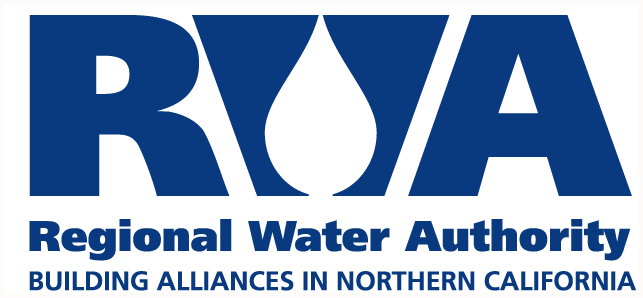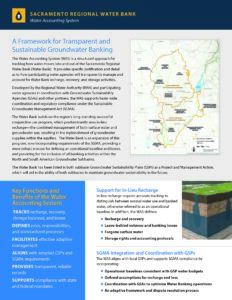New framework enhances transparency and accountability, helping to build confidence in groundwater banking and long-term sustainability
The Regional Water Authority (RWA), representing nearly two dozen water providers in the Sacramento region, has released the Water Accounting System (WAS) framework for the Sacramento Regional Water Bank (Water Bank).
The Water Bank is a network of groundwater wells, pumps, and pipelines that enable local water providers to withdraw and replenish underground water reserves. It’s estimated that the region’s aquifers can store twice the volume of water as Folsom Reservoir. The Water Bank is crucial for adapting the region’s water system to climate change, which is expected to reduce snowpack and cause more extreme droughts and floods.
The Water Accounting System provides a structured, transparent method for tracking water deposited into and withdrawn from the Water Bank, including losses and water intentionally left in the basin to support long-term groundwater sustainability. Developed by RWA and participating agencies in coordination with Groundwater Sustainability Agencies (GSAs) and other partners, the WAS aligns with state and federal regulations and supports basin-wide coordination under the Sustainable Groundwater Management Act (SGMA).
“The Water Accounting System builds confidence in groundwater recharge by providing a clear and consistent way to track how and when water is stored,” said RWA Executive Director Jim Peifer. “That’s especially important for in-lieu recharge—a foundational strategy of the Water Bank—where surface water is used in place of pumping to allow groundwater levels to recover. The system enhances transparency and supports consistent, reliable tracking of in-lieu recharge to manage it effectively over time.”
The WAS encompasses a detailed set of fundamentals and components designed to manage water banking activities responsibly and effectively. Fundamentals include, for example, that recharge (deposits) must be made before recovery (withdrawals).
Key elements of the WAS include:
- Recharge and Recovery Accounting: Tracks direct and in-lieu recharge, withdrawals for beneficial use, and establishes consistent definitions across all participating agencies.
- Operational Baseline Definition: Establishes benchmarks for typical surface and groundwater use to distinguish banking activity from normal operations.
- Banking Losses and Leave-Behind Requirements: Quantifies unrecoverable water and mandates a minimum 5 percent leave-behind per recharge event to support aquifer health.
- Forgone Surface Water: Accounts for surface water intentionally unused to enable recharge via in-lieu methods.
- Storage Rights and Protocols: Clarifies ownership, access, and use parameters for stored water within the Water Bank framework.
The WAS was developed in coordination with GSAs, local agencies, and technical experts to support basin-wide integration and GSP reporting. A centralized Data Management System (DMS), managed by RWA, will collect and organize submitted data, with annual reporting aligned to SGMA timelines and monthly accounting during active banking periods.
The Water Bank is identified as a Project and Management Action in both subbasin GSPs, and the WAS provides a critical foundation for advancing regional water resilience in the face of climate variability, reduced snowpack, and extended drought cycles.
“California needs proven tools that can be customized and scale across regions,” Peifer added. “The Water Accounting System is not just a local asset—it’s a working model for how to align groundwater recharge with SGMA compliance, permitting, and environmental safeguards.”
The complete WAS framework is available at https://sacwaterbank.com/was/. For additional information, contact Trevor Joseph, RWA Manager of Technical Services, at tjoseph@rwah2o.org.



